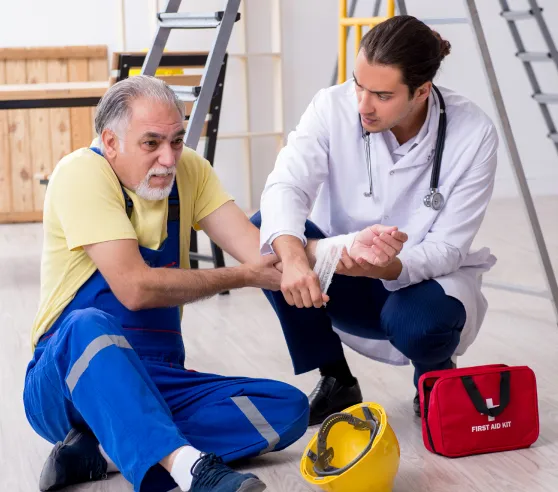Table of Contents:
- Introduction
- What is CPR First Aid Certification
- Who Needs CPR First Aid Certification
- Why is it Required for Healthcare Workers
- Why is it Required for Non-Healthcare Workers
- Get Certified in CPR First Aid Certification Today!
Emergencies can happen anywhere, often without warning. A patient in the hospital, a child in the classroom, or a colleague at the office may suddenly need immediate help. CPR first aid certification prove useful when real emergencies happen. Healthcare workers are required to stay certified so they can step in immediately during urgent situations. For non-healthcare professionals, it offers the confidence to act instead of standing by helplessly. Anyone can face an emergency, and CPR certification gives you the skills to act while waiting for paramedics.
In this blog, you’ll discover why certification is required for both healthcare and non-healthcare workers, along with the key benefits it provides.
What is a CPR First Aid Certification?
Cardiopulmonary Resuscitation (CPR) is an emergency measure performed when a person’s heart stops. It helps preserve blood flow and oxygen circulation in the body until clinical assistance is available. Skills such as chest compressions combined with rescue breaths help sustain an individual in emergency situations. CPR skills can save lives during sudden cardiac arrest or drowning cases.
First aid refers to the immediate care provided to someone who is injured or suddenly ill. It includes treating cuts, burns, sprains, choking, or allergic reactions. First aid doesn’t replace medical treatment but helps stabilize the person until professionals can take over.
Together, right first aid skills and course are essential in emergencies at home, at work, or anywhere. They give people the confidence to stay calm and take action when something goes wrong. According to the American Red Cross, 69% of trained adults felt more prepared, 63% felt more confident, and nearly half felt relieved knowing they had the skills to act in an emergency.
Who Needs CPR First Aid Certification?
Emergencies can happen anywhere. Someone might collapse at work, in a school, or in a hospital. In the first few minutes, people nearby need to know what to do. Being ready to help can make a real difference for the person in trouble. Both healthcare and non-healthcare professionals should be ready whenever an emergency occurs.
1. Healthcare Professionals
In healthcare, responding to emergencies is part of daily life. Patients can lose their breath or heartbeat without warning, and someone must be ready to step in immediately. That is why almost every role in this field requires proper training.
Here are some of the healthcare roles where this training is required:
- Doctors
- Nurses
- Paramedics
- Emergency medical technicians
- Hospital support staff
- Dentists
- Physiotherapists
- Medical technicians
- Clinical staff in therapy or outpatient centers
2. Non-Healthcare Professionals
Even outside hospitals, emergencies can happen anywhere. Children, coworkers, or members of the public may suddenly need help, and knowing how to respond can save lives.
Here are some of the non-healthcare roles where this training is required:
- Teachers
- Childcare workers
- Coaches and fitness trainers
- Lifeguards
- Security personnel
- Police officers
- Office employees
- Hospitality staff
- Construction and industrial workers
Why is it Required for Healthcare Workers?
Healthcare workers are the first line of response when patients face life-threatening emergencies. A patient’s heart can stop without warning, and in those first few minutes, quick action is everything. Certification gives professionals the skills and confidence to act immediately when lives are hanging in the balance.
Reasons why certification is required for healthcare workers:
- Hospitals and clinics require certified staff to meet patient safety standards.
- Medical workers regularly face emergencies where a patient’s heart suddenly stops.
- Certification ensures staff know how to use an Automated External Defibrillator (AED) safely and correctly.
- It prepares teams to act together and follow the same procedures.
- New healthcare employees usually take this training when they begin work.
Why is it Required for Non-Healthcare Workers?
Emergencies don’t just happen in hospitals. Emergencies can happen anywhere: in schools, gyms, construction sites, offices or restaurants. You may need to give CPR even if you don’t work in a hospital, before paramedics get there. The goal is to step in and keep the person safe until professional help gets there.
Reasons why certification is required for non-healthcare workers:
- Companies want employees who know how to respond during medical emergencies.
- Teachers, coaches, and childcare staff often supervise children who may face emergencies.
- Jobs that involve constant interaction with guests, clients, or crowds come with a greater responsibility to be prepared.
- Having trained staff means there’s always someone ready to help if a medical problem arises.
- Accidents are more common on building sites, and knowing CPR helps workers respond right away.
- Parents and caregivers benefit from knowing how to protect children at home.
Getting certified helps people feel more confident. Instead of freezing or panicking, they know the right steps to take if something goes wrong.
Some companies make CPR and first aid certification a requirement, making sure staff are trained to meet safety rules and protect the people around them.
Get Certified in CPR First Aid Certification Today!
Being prepared for emergencies is not something to put off. Whether you work in a hospital, a school, or an office, having the right training helps you know what to do in an emergency. CPR First Aid Certification is important for both healthcare and non-healthcare professionals when emergencies happen. Anyone who might face an unexpected situation can benefit from this knowledge. A CPR course prepares you to stay calm, act quickly, and help save lives until professionals arrive.
Don’t wait for an emergency to find out what you don’t know. Sign up for a CPR first aid course today and be prepared for whatever comes your way.

Leave a Reply